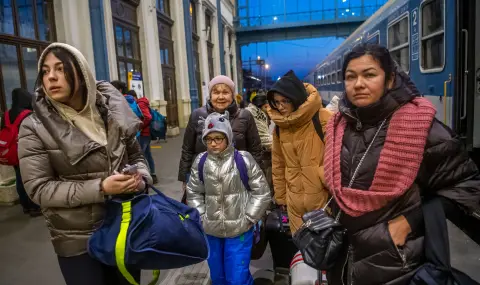Little children sleep on bags. Women with tired and helpless faces sit on suitcases, folding chairs or simply on the ground, while a policeman watches over the children from running down the street. These days, the Hungarian media is showing just such footage – they are from the village of Koc in northwestern Hungary.
One hundred Ukrainian refugees, mostly women and children, had to leave the place where they were accommodated, and they suddenly found themselves on the street, spending the night under the open sky. Associates of non-governmental Hungarian organizations tried to find them shelter – but in vain.
Along with the people from Koc, these days more than 3,000 Ukrainian refugees in Hungary were left homeless. Because on August 21, a new decree of Prime Minister Viktor Orbán entered into force, which severely limits aid for Ukrainian refugees.
"Only for those affected by hostilities"
According to the decree, state housing funding will only be provided to Ukrainian refugees who are from areas directly affected by the fighting in Ukraine. This will need to be verified with an up-to-date address registration.
Furthermore, government funding for accommodation will be time-limited in the future – from the date of registration of the respective refugee until the end of the following month. And the list of areas directly affected by the fighting in Ukraine will be updated by the Hungarian government on a monthly basis.
On the basis of the decree, more than 3,000 Ukrainian refugees are losing a roof over their heads. They are mostly from the westernmost part of Ukraine and have the official status of “temporarily in need of protection”. Most of these people are Hungarian-speaking Roma. Until now, they have been accommodated either in buildings that were empty or in large private boarding houses.
"Whoever wants to can stand on his own two feet"
The representative of the Hungarian government for Ukrainian refugees, Norbert Pall, already at the beginning of July, justified the restriction of aid in the following way: “After 2.5 years, this is a reasonable and correct measure, because during that time those who wanted to stand on their own feet in Hungary, they could do it”.
Gergei Gulyas, head of Hungarian Prime Minister Orbán's office, said at a press conference: “It is unacceptable to abuse because the state grants a lot of money every month to people who are able to work”. What the abuses in question consist of was not explained.
"New bottom of Hungarian migration policy"
„In fact, it is claimed that those affected have themselves to blame if they did not manage to find a home,” Andreas Lederer from the Helsinki Committee in Hungary told DV. “In most of the affected families, men work. But despite this, families cannot afford to rent a home or they simply cannot find one.“ Lederer defines the decree as a “new bottom of Hungarian migration policy”.
„What the Hungarian state is doing is shameful and outrageous, as the refugees not only come from a country at war, but also officially have the status of people in need of temporary protection. Therefore, it is against Hungarian and international law to deprive them of the possibility of accommodation and simply leave them on the street.“
Anti-Ukrainian propaganda
The decree is part of a series of anti-Ukrainian measures and declarations by the Orbán government. Relations between Hungary and Ukraine have been extremely bad for years, and after Russia's invasion of Ukraine, they have worsened even more. Hungary is the only EU member state that still maintains friendly relations with Russia.
Hungary does not participate in military aid to Ukraine and rejects arms deliveries to the neighboring country through its territory. Hungary is also the only EU country that does not participate in the current financial aid for Ukraine.
Orbán pleads for an end to EU sanctions against Russia, constantly calls Russian aggression a “Slavic fratricidal war” and defines Ukraine as “no man's land”. Hungarian media close to the government publish daily pro-Russian, anti-Ukrainian and anti-Western propaganda materials.
Targeted measures against the Roma?
The decree actually contradicts, in a sense, previous Hungarian government propaganda - as Orbán and his government are happy to emphasize the protection of Hungarian minorities in neighboring countries, including Ukraine. According to previous government claims, the Hungarian minority in western Ukraine had been subjected to "forced mobilization", making the protection of Hungarians there a particularly important task for the Hungarian government. In reality, mobilization there is carried out in a normal way, and representatives of the Hungarian minority are not disproportionately represented in the Ukrainian army.
A reason for the decree may be that most of those in need of protection are Hungarian-speaking Roma from western Ukraine. Viktor Orbán and other Hungarian government representatives constantly speak directly or indirectly in a discriminatory way about the Roma. In recent years, Orbán has repeatedly said about the Roma that “everyone should live by honest work, not by crime”.
Representatives of the Helsinki Committee, however, continue to guess what the motives for the decree are and say that it is hardly about austerity measures. “The monthly costs for the accommodation of the Ukrainian refugees are about one million euros. And only this year's dawn in Budapest on the occasion of the national holiday on August 20 cost five times more, Zholt Sekeres from the Helsinki Committee told DV.
„In any case, it must be said that the Hungarian government has once again deliberately provoked a humanitarian catastrophe, as it left thousands of people in need of protection homeless.“
Author: Keno Ferzek
